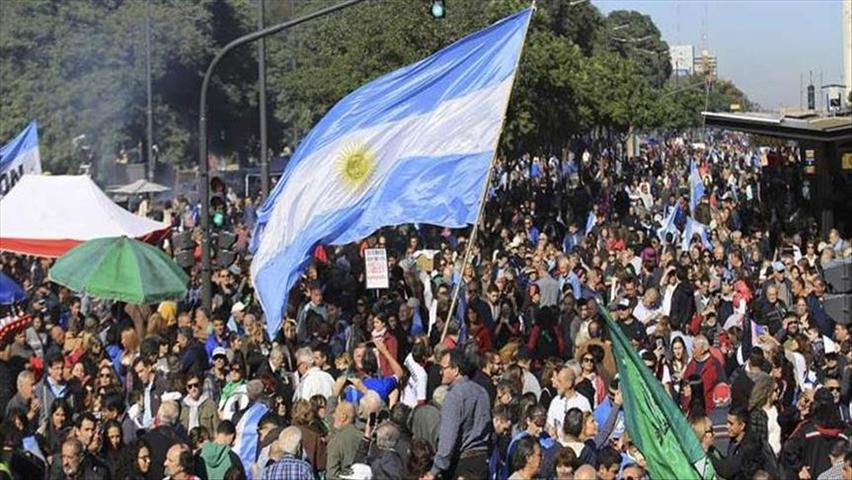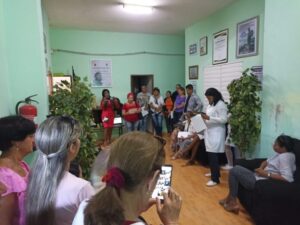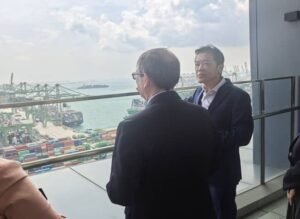45 days after the beginning of Javier Milei’s government, thousands of citizens flooded the Plaza del Congreso in the capital city and other spaces in several Argentine provinces as part of a general strike and a mobilization against the measures of the leader of La Libertad Avanza.
Summoned by the General Confederation of Labor (CGT), members of social, union and political organizations, retirees, deputies and human rights defenders, took to the streets, despite a heavy police operation and threats of fines and discounts by the Executive.
With the cry «La Patria no se vende» (The Homeland is not for sale), the demonstrators expressed their rejection of an adjustment plan, an anti-protest protocol, a decree of necessity and urgency and a package of regulations presented by the President to reform or repeal more than 300 laws, grant himself legislative powers, privatize public companies and change the labor system, among other provisions.
Among the participants were the Mothers and Grandmothers of Plaza de Mayo, Hijos, Somos Barrios de Pie, the Association of State Workers, the Central de Trabajadores de Argentina (CTA) and the CTA Autónoma, among many other groups.
Also supporting the strike and the march were the parties that make up the Unión por la Patria (UP) alliance, among them, the Justicialist and Communist parties, the Frente Renovador, the Patria Grande and the Conservative Popular.
According to the CGT, more than 1,500,000,000 people protested throughout the country, around one hundred organizations of the world expressed their support to the struggle of the Argentine workers’ movement and there were mobilizations in front of the embassies of this nation.
From the podium, CGT leader Pablo Moyano stated that a Peronist cannot support Milei’s measures and asked the deputies not to betray the workers or sell national sovereignty.
On her part, the Mother of Plaza de Mayo Taty Almeida urged to preserve unity and not to give up.
We, the crazy women who, in spite of our canes and wheelchairs, are still standing, tell them. Our children were workers. The 30 thousand detained-disappeared are present, now and always, she said, remembering the victims of the last civil-military dictatorship (1976-1983).
According to the analyst Luis Bruschtein, the act in front of the Congress broke several historical records: it is the first one against a government 45 days after taking office, it was one of the most massive union protests of the democracy and it was called during vacations, in spite of the intense heat.
The great call was the response to the brutal strategy of the Government to send the DNU and the Omnibus Law to put an end to the social security system, labor relations and workers’ rights, privatize State enterprises, destroy small and medium industry, attack culture, unprotect the environment, destroy wages and income and favor big corporations, he pointed out.
For his part, UP deputy Germán Martínez described the police deployment as disproportionate.
Recently, three special rapporteurs of the United Nations (UN) expressed their concern about an anti-protest protocol approved by the Minister of Security, Patricia Bullrich.
The experts on Freedom of Peaceful Assembly and Association, Clement Nyaletsossi Voule, Promotion and Protection of the Right to Freedom of Opinion and Expression, Irene Khan, and on the Situation of Human Rights Defenders, Mary Lawlor, asked Milei to review these measures due to their implications and risks for citizens.
In a recently published document, the UN representatives consider that the protocol and the Omnibus Law are incompatible with international standards and impose undue restrictions.
We request the Government to ensure a review in coordination and cooperation with human rights organizations and international mechanisms. This exercise should take into account the full range of obligations that the State assumed when ratifying the various international treaties, the text indicates.
We would also like to confirm our availability to provide any kind of technical assistance, it adds.
The rapporteurs warn that Argentina could be «in the presence of the phenomenon of criminalization of social protest through the use of criminal law».
They also question the unjustified intervention of the police to restrict freedom of assembly, expression and movement.
«The right to peaceful assembly, together with other related rights, constitutes the very foundation of a participatory system of government based on democracy, human rights, respect for the law and pluralism,» they asserted.
In addition to this report, the discontent of the workers and the criticism of UP legislators, several governors questioned the economic measures promoted by the country’s leadership.
In this context, the minister of the sector, Luis Caputo, communicated on January 26 the decision to withdraw the fiscal chapter of the package of laws sent by the president to Congress to facilitate its approval.
The eliminated regulations provided for the laundering of capital, a tax moratorium, an advance on personal property tax, an increase in export duties and a change in the pension formula.
However, the Government’s bill includes other highly questioned aspects such as the attribution of legislative functions to the Executive and the establishment of an economic, social security, security, defense, tariff, energy, health, administrative and social emergency until 2025 with the possibility of renewing it for two years.
On the other hand, Caputo confirmed that his portfolio will incorporate the areas included in the Infrastructure portfolio, which will become a secretariat after the resignation of its head, Guillermo Ferraro.
Ferraro’s departure was confirmed on January 27th by the Casa Rosada and was attributed to personal problems.




